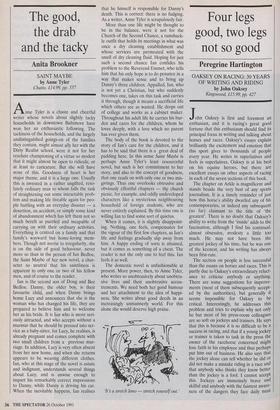The good, the drab and the tact
Anita Brookner
SAINT MAYBE by Anne Tyler Chatto, €14.99, pp. 337 Anne Tyler is a chaste and cheerful writer whose novels about slightly tacky households in downtown Baltimore have won her an enthusiastic following. The tackiness of the households, and the largely undistinguished goings-on of the families they contain, might almost ally her with the Dirty Realist school, were it not for her resolute championing of a virtue so modest that it might almost be open to ridicule, or at least to caricature. But she will have none of this. Goodness of heart is her major theme, and it is a large one. Usually this is invested in a rather ungifted, reso- lutely ordinary man to whom falls the task of straightening out some intractable prob- lem and making life liveable again for peo- ple battling with an everyday disaster — a desertion, an accident, or simply some kind of abandonment which has left them not so much bereft as puzzled and incapable of carrying on with their ordinary activities. Everything is centred on a family and that family's wayward but home-loving mem- bers. Though not averse to irregularity, she is on the side of good behaviour, never more so than in the person of Ian Bedloe, the Saint Maybe of her new novel, a char- acter so neutral that his saintliness is apparent to only one or two of his fellow men, and of course to the reader.
Ian is the second son of Doug and Bee Bedloe. Danny, the older boy, is their favourite child, and when Danny brings home Lucy and announces that she is the woman who has changed his life, they are prepared to believe him and to welcome her as his bride. It is Ian who is more seri- ously attracted, and who accepts without a murmur that he should be pressed into ser- vice as a baby-sitter, for Lucy, he realises, is already pregnant and comes complete with two small children from a previous mar- riage. In addition, Lucy is very often absent from her new home, and when she returns appears to be wearing different clothes. Ian, who at this stage of the novel is astute and indignant, understands several things about Lucy, and is unwise enough to impart his remarkably correct impressions to Danny, while Danny is driving his car. When the inevitable happens, Ian realises that he himself is responsible for Danny's death. This is correct: there is no fudging. As a writer, Anne Tyler is scrupulously fair.
More than one life might be thought to be in the balance, were it not for the Church of the Second Chance, a ramshack- le outfit that holds its meetings in what was once a dry cleaning establishment and whose services are permeated with the smell of dry cleaning fluid. Hoping for just such a second chance Ian confides his problem to the Reverend Emmet, who tells him that his only hope is to do penance in a way that makes sense and to bring up Danny's three children. Appalled, Ian, who is not yet a Christian, but who suddenly becomes one, takes on this task and carries it through, though it means a sacrificial life which others see as wasted. He drops out of college and works as a cabinet maker. Throughout his adult life he carries his bur- den and cares for the children, whom he loves deeply, with a love which no parent has ever given them.
The body of the book is devoted to the story of Ian's care for the children, and it has to be said that there is a great deal of padding here. In this sense Saint Maybe is perhaps Anne Tyler's least resourceful novel, but such is her commitment to her story, and also to the concept of goodness, that one reads on with only one or two mis- givings. Thus one overlooks obtrusive and obviously effortful chapters — dip church picnic, for example, and oddly undeveloped characters like a mysterious neighbouring household of foreign students, who are never entirely explained. By this time one is willing Ian to find some sort of quietus.
When it comes, it is slightly disappoint- ing. Nothing, one feels, compensates for the vigour of the first few chapters, as Ian's life and feelings gradually slip away from him. A happy ending of sorts is attained, but it comes as something of a cheat. The reader is not the only one to feel this. Ian feels it as well.
The domestic novel is unfashionable at present. More power, then, to Anne Tyler, who writes so unobtrusively about unobtru- sive lives and their unobtrusive accou- trements. We need both her good humour and her attachment to the idea of happi- ness. She writes about good deeds in an increasingly unmannerly world. For this alone she would deserve high praise.
`It's a stretch limo — stretch yourself out.'








































 Previous page
Previous page